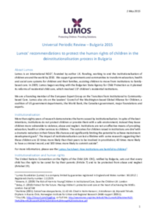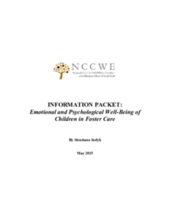Demographic Data
|
Sources: World Bank, UNICEF, UNDP HDR 2015, DHS 2011 |
Displaying 11471 - 11480 of 14389
In this paper, Lumos reviews Bulgaria’s national strategy on deinstitutionalisation, adopted in 2010, and provides recommendations for ensuring the rights of children in the process.
This information packet presents an overview of facts, statistics, policies, legislation, best practices, model programs, and additional resources related to the US child welfare system and the emotional and psychological well-being of children involved in that system.
This document, developed through a mapping exercise conducted by the National Council for Children’s Services (NCCS) and the Department of Children Services (DCS) of Kenya, provides a comprehensive list of the agencies and programs in Kenya that provide services for children.
In an effort to support practitioners to address some challenges of trying to undertake quality research, a group of child protection networks and organizations - the Community Child Protection Exchange, the CP MERG, the CPC Learning Network, and REPSSI - came together to produce this joint newsletter reflecting upon some groups’ successes and challenges working on child protection research and M&E, including working with a limited budget in low-resource settings.
El Servicio Social Internacional lanza su Manifiesto por una ética de la adopción internacional.
Le Service Social International lance son Manifeste pour une éthique de l’adoption internationale.
The International Social Service (ISS) has launched its Manifesto For Ethical Intercountry Adoption. The Manifesto seeks to promote ethical practices by all adoption stakeholders to better protect children, whether in the receiving country or country of origin, including inter alia, biological parents, adoptive parents, professionals and government representatives.
This article examines an alternative approach to child protection which consists of community-driven, bottom-up work that enables nonformal–formal collaboration and alignment, greater use of formal services, internally driven social change, and high levels of community ownership. The article offers a case example of a community-driven program in Sierra Leone.
The ideas and questions raised in this chapter derive from the referrals of children in care or adopted whom the author has seen for psychotherapy.
This chapter explores the idea of belonging through the lens of attachment theory.



